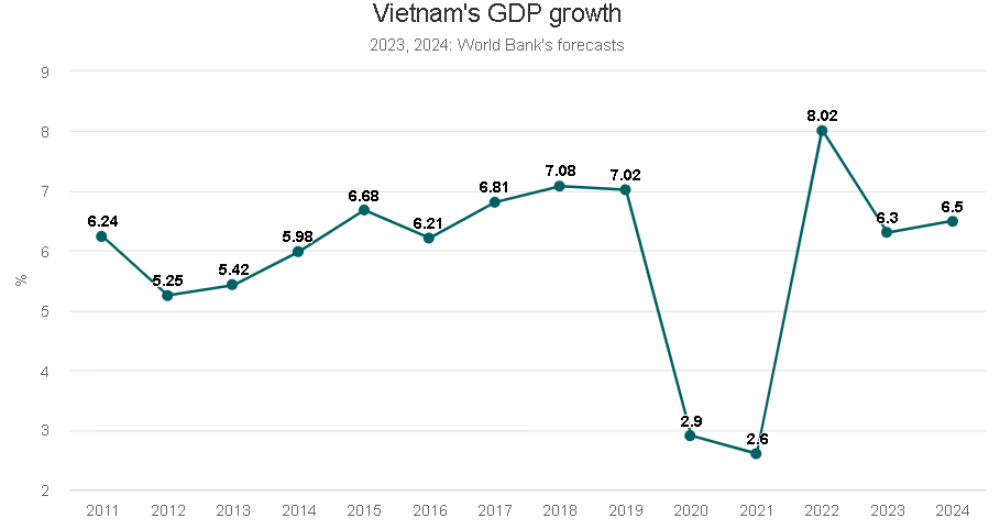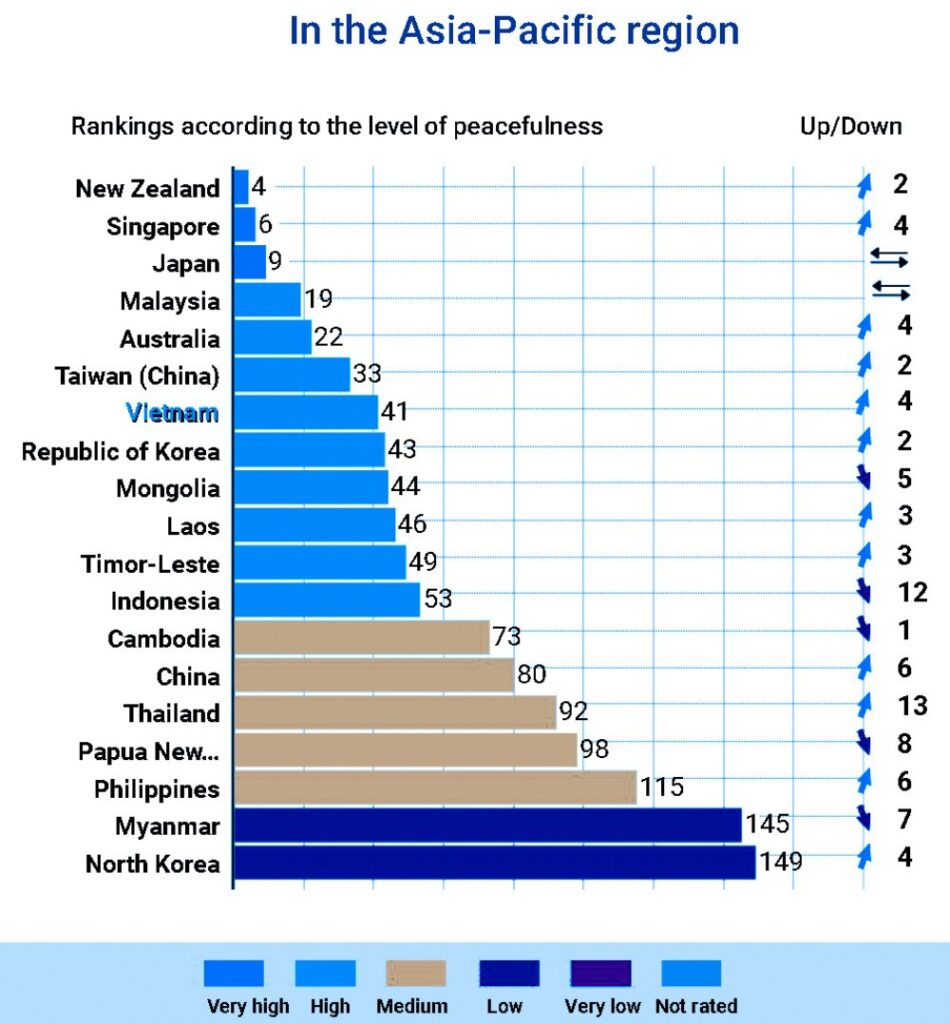In today’s globally connected world, businesses constantly seek reliable sources of IT talent to fuel their growth and innovation. A key factor that underpins such reliability is economic and political stability. In this article, we will explore how Vietnam, with its remarkable economic and political stability, has emerged as a dependable pool of IT professionals. We will delve into the economic stability and growth of Vietnam, examine its political landscape and governance, and assess the impact of this stability on education and skill development. Additionally, we will discuss how this stability fosters sustained productivity and fruitful business partnerships, including case studies of successful engagements. Supporting data and reports will back our claims, and we will underline the favorable investment environment it creates for foreign companies. Finally, we will look to the future to understand the sustainability of Vietnam’s stability and its implications for the IT industry.
Economic Stability and Growth
Vietnam’s economic stability and growth have been nothing short of remarkable in recent years. With consistently positive GDP growth rates, foreign direct investment pouring in, and various economic indicators signaling a thriving environment. For the IT sector, this economic stability provides a dependable environment for businesses to thrive.

According to the World Bank, Vietnam’s GDP growth rate averaged around 7.1% from 2016 to 2019, showcasing its resilience and consistency in economic performance. This stable economic backdrop not only assures businesses but also encourages investments in the nation.
The World Bank projects growth of 4.7 per cent in 2023, with a gradual recovery to 5.5 per cent in 2024 and 6 per cent in 2025. Vietnam’s economic growth slowed from 8 per cent in 2022 to 3.7 per cent in the first half of 2023, the report noted. The reason was due to a sharp decline in external demand, reflected in a 12 per cent fall in export turnover compared to the same period last year. The export sector, which is estimated to contribute about 50 per cent of Vietnam’s GDP, was heavily affected. Domestic demand also slowed due to the gradual reduction of the low starting effect of the post-Covid-19 recovery period last year, and the weakening of consumer confidence. The growth rate of final consumer spending slowed to only 2.7 per cent in the first half of the year, much lower than the 6.1 per cent rate in the first half of 2022.
Regarding the FDI sector, the outlook for Vietnam remains solid as it is still an attractive destination for foreign investors. Even during the Covid-19 period, Vietnam proved itself to be a healthy exporter when it was able to supply export products to other markets.
Foreign direct investment (FDI) has poured into Vietnam, attracted by its growing economy and favorable investment climate. The government has actively pursued policies to encourage foreign investment, creating special economic zones and providing incentives to attract global businesses. This influx of FDI not only drives the economy but also bolsters the IT sector.
Multinational corporations often set up shop in Vietnam to tap into its skilled workforce and cost-effective labor market. This, in turn, provides opportunities for local IT professionals to collaborate with international firms, gaining valuable experience and exposure to global best practices.
Political Landscape and Governance
The current government has held power since Vietnam’s 1975 reunification, meaning that there have been more than 30 years of political stability in the country. The last major conflict with a neighboring country was almost 30 years ago, in 1978. Two American presidents (Bill Clinton during his presidency and in 2006, and George W. Bush during the APEC summit) have visited the country, and Bush met with several top officials including the President, Prime Minister, and Communist Party Chief, thereby underscoring the country’s political stability.

According to the Global Peace Index 2023, Vietnam is the 41st most peaceful country among 163 countries and territories, up four places from the previous year. In the GPI ongoing domestic and international conflict domain specifically, Vietnam’s peacefulness is squarely among the top one-third of countries measured with 1.403 in score. Vietnam is also placed in the top third in the societal safety and security, as well as the militarisation domains.
While economic stability is a pivotal factor in establishing Vietnam as a reliable source of IT talent, an often overlooked but equally crucial aspect is the country’s political landscape and governance. The combination of a stable political environment and effective governance plays a pivotal role in creating the ideal conditions for nurturing a flourishing IT sector.
Political Stability
Vietnam has been synonymous with political stability for an extended period. A key driver of this stability is the country’s one-party system, which has maintained a firm grip on power, ensuring a consistent political environment. This long-standing political stability has been a crucial factor in attracting both domestic and foreign investments, further boosting the growth of the IT sector.
In the world of IT, where project timelines are critical and clients require assurance that their investments are secure, political stability is an invaluable asset. Businesses can operate with confidence, knowing that the political landscape will not be marred by sudden changes or disruptions.
Effective Governance
Effective governance is equally vital in the context of the IT sector. Vietnam has consistently scored well in global indices measuring government efficiency and the ease of doing business. These rankings reflect the government’s commitment to creating a conducive environment for businesses and investors. As a result, businesses, including those in the IT sector, can operate smoothly without undue bureaucratic hurdles.
The efficient governance in Vietnam ensures that regulations and policies support rather than hinder IT businesses. The government actively encourages innovation and entrepreneurship, facilitating the growth of a vibrant IT ecosystem.
The impact on development of Vietnam’s IT industry
Encouragement of Skill Development and Innovation
The Vietnamese government has recognized the importance of technology and innovation in driving economic growth. Policies and initiatives have been put in place to foster these sectors. For instance, the government’s focus on supporting research and development activities contributes to a culture of innovation within the IT sector. Such initiatives translate into a skilled and innovative IT workforce, which is attractive to both domestic and international businesses.
Information technology (IT) is identified as an important part of the digital transformation process, aiming to provide basic technologies, contributing to comprehensive changes in both organization, business processes, and corporate culture. industry to human participation in the implementation process.
During the period 2011-2020, IT infrastructure in Vietnam has been invested and developed; Research and development of IT applications have achieved great progress with the participation of many sectors, the involvement and determination of the entire political system. Along with a number of telecommunications and IT brands ranked in the world’s top 500, many achievements in the IT field have been confirmed, playing a decisive role in the digital transformation process.

Revenue from Vietnam’s information technology (ICT) industry in the past 5 years has continuously grown, from nearly 103 billion USD in 2018 to more than 124.67 billion USD in 2020 and 136.15 billion USD in 2021. In the GII Global Innovation Index 2021 rankings, Vietnam ranked 44th out of 132 countries/economies. Among the group of 34 low-middle income countries included in the GII ranking list in 2021, Vietnam continues to hold the top position.
Based on annually report from moet from 2019 – 2022 in ratio of information technology related majors on annual general universities/ colleges enrollment quotas, annual students enrollment whose major in Computer Science & IT-related major) accounts for about 50,000 – 57,000; Tech/ Digital labor force working in Computer Science & IT -related sectors accounts for about 530,000.
Vietnam’s stable economic conditions play a significant role in its education and skill development system. A stable economic environment enables consistent investments in education and training. As a result, Vietnam has seen significant progress in developing a skilled IT workforce. The government and businesses alike have recognized the importance of nurturing a tech-savvy talent pool to cater to the growing demand for IT services.
Sustained Productivity and Business Partnerships
The reliability of Vietnam’s IT professionals is a direct result of the country’s stability. This has been a key factor in their decisions to continue collaborating with professionals from Vietnam, forming long-lasting and productive partnerships. Businesses working with Vietnamese IT experts have consistently praised the quality of work delivered. These professionals undergo training and education, honing their skills to meet international standards. The stability of the country provides the necessary conditions for this quality assurance. Vietnamese IT professionals have built a reputation for their punctuality and ability to meet project deadlines consistently. Clients and partners can confidently plan their projects, knowing they can rely on the timely delivery of results.
Beyond reliability, Vietnamese IT professionals often offer cost-effective solutions. The stable economic environment allows them to provide competitive pricing while maintaining quality. Businesses find that this combination of reliability and affordability makes Vietnamese IT professionals a valuable asset to their projects, ensuring long-term collaborations.
Vietnam’s stable political environment encourages a collaborative mindset among its IT professionals. They are open to working closely with clients and partners, understanding their needs and objectives. This collaborative approach fosters not just successful projects but also the development of relationships built on trust and shared goals.
International Relations and Trade Agreements
Vietnam’s stable political environment extends to its foreign relations, particularly in terms of trade agreements. The country has actively participated in numerous international trade agreements, including the Comprehensive and Progressive Agreement for Trans-Pacific Partnership (CPTPP) and the European Union-Vietnam Free Trade Agreement (EVFTA). These agreements provide businesses in the IT sector with access to a vast and diverse market, further enhancing the appeal of Vietnam as a hub for IT talent.
Vietnam’s growing network of international partnerships creates opportunities for IT professionals to engage in cross-border projects and gain exposure to international standards and practices. IT professionals can work with international partners, which can be particularly valuable in terms of knowledge transfer and skill development. Political stability ensures that professionals can move freely and engage in cross-border projects without significant restrictions.
Favorable Investment Environment
Vietnam’s stability in both economic and political aspects acts as a magnet for foreign companies. It instills a sense of security and confidence among investors, assuring them of a reliable and predictable landscape in which to operate. This trust forms the foundation for long-term collaborations, serving as a catalyst for ongoing business growth and development.
In essence, the synergy of economic and political stability fosters an atmosphere where foreign entities engaging with Vietnamese IT professionals can flourish. This favorable environment not only assures the safety of investments but also nurtures the potential for sustained and fruitful business ventures, ultimately contributing to the continued success and expansion of the IT industry in Vietnam.
Foreign direct investment (FDI) has poured into Vietnam, attracted by its growing economy and favorable investment climate. The government has actively pursued policies to encourage foreign investment, creating special economic zones and providing incentives to attract global businesses. This influx of FDI not only drives the economy but also bolsters the IT sector.

Vietnam currently has 38,084 valid foreign-invested projects with a total registered capital of 453.26 billion USD, of which the accumulated realised reached about 287.1 billion USD, or 63.3% of the total. In the first eight months of this year, the country attracted 1,924 new projects, having 830 turns of projects registered to adjust their investment capital and 22,268 transactions of capital contribution for share purchases with a value of nearly 18.15 billion USD. Statistics from the MoST showed that FDI firms accounts for over 90% among enterprises registering for technology transfer in Vietnam. The country recorded over 400 technology transfer agreements between July 2018 till the end of 2022.
Multinational corporations often set up shop in Vietnam to tap into its skilled workforce and cost-effective labor market. This, in turn, provides opportunities for local IT professionals to collaborate with international firms, gaining valuable experience and exposure to global best practices.
Expanding IT Market
As the Vietnamese economy continues to grow, so does the demand for IT services and solutions. Businesses across various sectors are increasingly relying on technology to enhance their operations, leading to a surge in demand for IT professionals. The stable economic conditions provide a foundation for this growth, as companies are more likely to invest in IT when the economy is flourishing.
According to Unesco Statistics, Việt Nam is in the top 10 Countries That Produce The Most Engineers after Russia, USA, Iran, Japan, South Korea, Indonesia, Ukraine, Mexico & France; top 6 countries for software outsourcing services (2021) (Kearney’s Global Service Location Index). Vietnam also was one of the two leading software outsourcing destinations in SEA (2022 Global Software Outsourcing Trends and Rates Guide).
The growing IT market means more job opportunities for IT experts in Vietnam. From software development to data analysis and cybersecurity, the demand for IT professionals covers a wide spectrum of specializations. Moreover, this expanding market attracts both domestic and international IT companies, further diversifying the IT landscape in Vietnam.
Sustainability and Future Prospects
Vietnam’s commitment to sustainability extends beyond the present economic and political stability, making it a beacon of long-term reliability in the realm of IT talent. Understanding the nation’s dedication to creating an ideal environment for businesses and its continuous investments in education sheds light on the promising future prospects of this dynamic Southeast Asian country.
The government’s commitment to nurturing a highly skilled IT workforce is evident in its consistent support for educational institutions, research, and development programs. These investments are not limited to the short term but are part of a long-term plan to ensure a steady supply of IT professionals. Vietnam’s commitment to creating an ideal environment for businesses means that it is poised to adapt to technological advances. It can meet the demands of emerging industries, such as artificial intelligence, data science, and cybersecurity, ensuring its relevance in the ever-evolving tech landscape. Vietnam’s stability and reputation as a reliable source of IT talent position it as a global player. It is increasingly participating in international collaborations and projects, contributing to its relevance in the global IT industry.
In conclusion, Vietnam’s economic and political stability is a vital cornerstone that has made it a reliable source of IT talent. From economic growth and political stability to the impact on education and skill development, it is clear that Vietnam’s stability plays a pivotal role. This stability fosters sustained productivity and results in fruitful business partnerships, as evidenced by numerous successful case studies. Supporting data and reports reinforce the claims made in this article, and the favorable investment environment only strengthens Vietnam’s appeal. With a commitment to sustainability, Vietnam is well-poised to continue offering a pool of dependable IT professionals, making it an attractive choice for businesses seeking reliable talent.
GET IN TOUCH WITH FREEC CONSULTING









